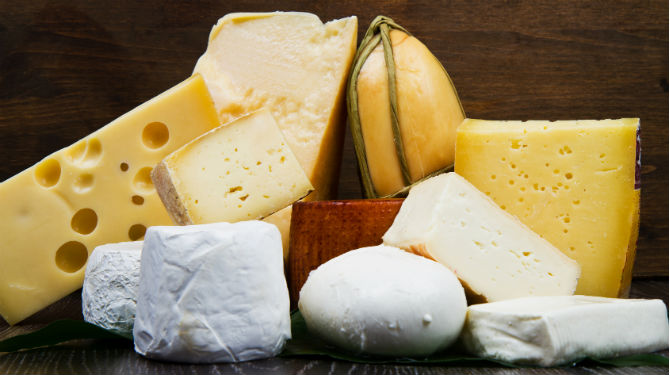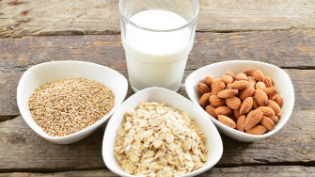
Say Cheese - Know the Types & their Nutrition

Cheese is the classic ‘milk derived food’ loved by individuals of all ages. The gooey liquid oozing out from your cheese burst pizza or the beautiful cheese slices to upgrade your vegetable sandwich, cheese is the high-style ingredient everywhere. Cheese making started 4000 years ago when people bred animals and processed their milk. Did you know that there are at present over 1500 types of cheeses made around the world!
So how is this goodie made? Cheese as we know is made from milk, which can be cow’s, sheep’s, goat’s, yak's etc. The basic steps for cheese making are:
- The milk is heated to very high temperature to kill microorganisms.
- It is then curdled by adding 'lactic acid bacteria'.
- To this, an enzyme - rennet (found in the stomach lining of very young animal or from mold or yeast ) is added for separation of water from curd leaving behind a soft spongy mass which is further pressed to expel the remaining water.
- The final step is ripening of cheese which involves addition of salt or other ingredients. The length of time it is ripened for gives different varieties of cheese.
Speaking of cheese varieties, they are mainly differentiated depending on appearance and texture:
Blue cheese:
Blue Cheese contains blue colour streaks made by a mold within it which is harmless. Known for being notoriously high in fat and sodium, this cheese is also a good source of protein and vitamin B-12, both of which are required for proper hormone function and maintaining body immunity. An example of Blue Cheese is Roqueforte. For more variieties of blue cheese, check out Foodesto, Nature's Basket, Gourmetco.
Pasta filata:
Are your awestruck and gaze happily as you pull apart a peice of pizza from the whole and see the cheese stretch effortlessly from it?? This is the adorable pasta filata. It is obtained when cheese is heated and stretched in last step of processing forming a stringy cheese. Did you know that Mozzarella is a type of Pasta filata? You can choose from a range of mozarella cheese at Nature's Basket.
Processed cheese:
This cheese is a blend of fresh and ripened cheese, which is mixed, heated without any further ripening. Often enjoyed with a slice of bread or toast, it is an all time favourite. eg. American/ processed cheese, Amul cheese, Britannia cheese (slices and cubes). You can shop from an arrayof brands at Localbanya to upgrade your sandwich with this cheesy delight.
Hard cheese:
As the name suggests, this type of cheese is hard due to it's long term ripening. Hard cheese which is crumbly,is mainly used for grating over salads and entrée. Hard cheese have different flavours like nutty, pungent, caramel etc. eg. Parmesan, Swiss. You can treat yourself to these cheeses by purchasing them at Nature's Basket.
Semi hard cheese:
As the name suggets, this cheese is softer than hard cheese yet crumbly in nature. They have a fairly long shelf life as well as plethora of flavours just like hard cheese eg. Cheddar, Gouda. Get these tatsebuds delighting cheeses at Foodesto, BigBasket and Nature's Basket.
Semi-soft cheese:
Cheese in this category have pliable texture retaining fresh milk flavour. They also have a bit of pungency or sharpness depending on the type. The shelf life varies with the amount of moisture in the cheese. Soft and creamy cheese like Crescenza have a shelf life of only 10 days depending on when it is bought. Harder and firmer cheese like Monterey Jack have longer shelf life. These cheese melt well when cooked. eg. Fontina. You can get these melt in the mouth treats at Foodesta.
Soft and fresh:
This type of Cheese has high moisture and is not aged. Usually bland with low salt content, these cheeses are enjoyed alone or with light seasoning added to it. eg. cottage cheese(paneer), Feta, ricotta, Camembert, cream cheese. Buy these fresh cheesy highlighters of your meals at Foodesta, Nature's Basket, BigBasket.
Now that you know some types, which is more nutritious would be up your mind. Most cheeses have similar nutritional value, except a few as shown in this table:
| Cheese(30g) | Energy(kcal) | Protein(g) | Fat(g) | Sodium(mg) | Calcium(mg) |
| Cream | 103 | 2 | 10 | 110 | 29 |
| Cottage | 29 | 3 | 1 | 109 | 25 |
| Swiss | 114 | 8 | 8 | 21 | 237 |
| Ricotta | 52 | 3 | 4 | 25 | 62 |
| Mozarella | 90 | 7 | 0 | 188 | 152 |
| American Processed | 110 | 5 | 9 | 501 | 314 |
| Blue | 106 | 6 | 9 | 344 | 158 |
| Camembert | 90 | 6 | 7 | 239 | 116 |
| Feta | 79 | 4 | 6 | 275 | 148 |
| Gouda | 107 | 7 | 8 | 246 | 210 |
| Parmesan | 118 | 11 | 8 | 413 | 355 |
| Cheddar | 122 | 7 | 10 | 193 | 202 |
Source : USDA
You might want to watch out the sodium in cheese. Processed cheese is higher in sodium than others. Salt is important for giving flavour and maturity to cheese along with increasing the product life. Some low sodium cheeses like Ricotta, Swiss, cream cheese, Mozzarella and Brick are good options.
Worried about lactose? Cheese has minimal amount of lactose as most of it is removed in the water when drained from curd, so yes lactose intolerant individuals can have a bit of the good old cheese!
Are you a strong vegetarian? If yes, then, there is vegetarian cheese available too. These cheeses are not prepared from rennet of animals but microbial rennet from mold/yeast/plant derived is used to make cheese. Check for the green mark on the food label before buying cheese.
Love your cheese? Then enjoy it well by following these simple tips:
- Do not store cheese with strong smelling foods as it absorbs other flavours and spoil.
- Keep it wrapped in wax paper or loose fitting food bag (never store it in plastic wraps) to prevent it from losing moisture. You can also apply a coat of vegetable oil and store it in air-tight container to prevent it from spoiling.
- Let cold cheese warm up a half hour before eating to allow aroma and flavour to develop, in other words have it at room temperature
- Wrap blue cheese all over as the mold on it can spread to other foods and spoil them
- Keep cheese in the crisper as it has constant temperature and is not too cold
- Keep as much cheese as can be consumed within few sittings after opening it from the pack before it loses its original flavour.
Its time you start a nutritious journey with this wonderful food. Looking beyond the fat you will see the wonderful benefits it has to offer. Add it to your on the go meal or comfort food, cheese has something to offer to everyone who indulges in it. To quote the famous food television celebrity Anthony Bourdain " You have to be a romantic to invest yourself, your money and your time in cheese".
So go ahead, enjoy your cheesy delicacy, savour this very special food and say CHEESE!!












